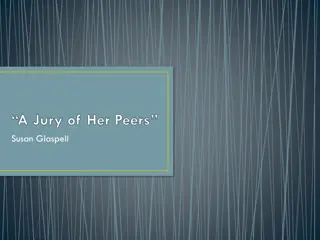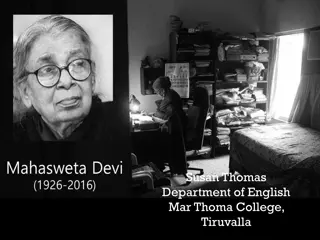Analysis of "Trifles" by Susan Glaspell in the College of Education's English Department
"Trifles" is a one-act play written by Susan Glaspell in 1916, focusing on the investigation of a murder at the Wright household. Through the characters and setting of the deserted farmhouse, the play explores themes of loneliness, abuse, and justice for women. Two women, Mrs. Peters and Mrs. Hale, uncover crucial evidence that challenges traditional gender roles and leads to a deeper understanding of the crime. The play raises questions about the treatment of women in society and highlights the importance of empathy and perspective in solving complex issues.
Download Presentation

Please find below an Image/Link to download the presentation.
The content on the website is provided AS IS for your information and personal use only. It may not be sold, licensed, or shared on other websites without obtaining consent from the author.If you encounter any issues during the download, it is possible that the publisher has removed the file from their server.
You are allowed to download the files provided on this website for personal or commercial use, subject to the condition that they are used lawfully. All files are the property of their respective owners.
The content on the website is provided AS IS for your information and personal use only. It may not be sold, licensed, or shared on other websites without obtaining consent from the author.
E N D
Presentation Transcript
College of Education English Department Subject : Drama Stage : Four Teacher s Name : Shirin Kamal Ahmed
1. DRAMATIC STRUCTURE & SETTING Trifles was written as a one-act play. A one-act play is a play that has only one act, as distinct from plays that occur over several acts. One-act plays may consist of one or more scenes. Trifles sets in a small farmhouse. The action of the play takes place in the course of a single day. The setting is perfect for the plot. It gives the story a dynamic look without revealing much of anything into Mrs. Wrights life. It shows that Mrs. Wright was a lonely farmers wife and being on the farm gets lonely due to the fact that you really do not have close neighbours. It also shows the relationship that Mrs. Hale and Mrs. Peters have with Mrs. Wright.
Plot : Trifles is a play authored by Susan Glaspell in the year 1916. The events are depicted in Mr. & Mrs Wright s house. This play begins with two women and three men walking into the wright s house that is now abandoned. Everywhere you look, there is unfinished business. A loaf of bread and dirty dishes are over the counter. It is obvious that someone hurriedly left the place or was unexpectedly taken from the place. An investigation is about to start at the Wright s deserted farmhouse, for it is in this place that John Wright has been murdered apparently through strangulation with a rope. The primary suspect of this horrendous crime is his wife. Sheriff Peters, the county attorney, and Mr Hale, a nearby farmer, are the ones in charge of the investigation. They ransack the house for any clues. However, the real investigators turn out to be Mrs Peters and Mrs Hale.
Even though the male investigators constantly poke fun at the women for showing too much concern for feminine things, such as Mrs Wright s incomplete quilt. However, these women s obsession with woman stuff essentially allowed them to crack the case. These ladies came across a pet canary owned by Mrs Wright. Its wrung neck led them to the uncovering of the mystery. Mrs Peters and Mrs Hale immediately knew that the cruel Mr Wright broke the Canary s neck. What s more, they also discovered that after many years of emotional abuse and neglect, Mrs Wright retaliated on her husband. She had decided to offer him a taste of his own bitter medicine by doing unto him what he did to her pet canary. The play culminates with the ladies concealing the canary from the male investigators. This effectively denied them evidence of motive needed to prosecute Mrs Wright. Eventually, the events leave a lot of questions about justice for women and the oppressed.
2. CHARACTERS IN TRIFLES John Wright A local farmer, he was commonly considered a good, dutiful man, but he was also a hard man and neglected his wife's happiness. He paid little attention to his wife's opinions and prevented her from singing. The play focusses on the motive for his murder. Mrs. Wright Born Minnie Foster, she used to be a happy, lively girl who sang in the local choir, but after she married John Wright, her life became unhappy and forlorn. Although she does not appear in the play, she is the main suspect in her husband's murder and sends Mrs. Peters and Mrs. Hale to collect a few minor items for her from the farmhouse.
George Henderson The county attorney, he has been called to investigate the murder of John Wright and will probably serve as the attorney for the prosecution in the event of a trial. He is young and professional in manner, but he often dismisses the female interest in minor details of domesticity, and he disparages Mrs. Wright for what he perceives as her lack of homemaking abilities. Henry Peters The middle-aged local sheriff and husband of Mrs. Peters, he is at John Wright's house to examine the scene of the crime. Like Henderson, he gently teases the women about their interest in Mrs. Wright's quilt.
Lewis Hale A neighbouring farmer, he had entered the Wright farmhouse to ask John about acquiring a telephone, only to find a strangled man and a wife acting very bizarrely. He says, "Women are used to worrying about trifles." Mrs. Peters A relative newcomer to the town who never knew Mrs. Wright before John Wright married her, Mrs. Peters is "a slight, wiry woman" with a "thin, nervous face." She is married to the sheriff and prefers to follow the law, often apologizing for the behavior of the men because they are only doing her duty. Mrs. Peters understands loneliness and the world of the female domestic.
Mrs. Hale The wife of the farmer Lewis Hale, she is of a heavier build than Mrs. Peters and resents the condescension shown to her by the men in general and Henderson in particular because of her gender and domestic occupation. She remembers Mrs. Wright as the young Minnie Foster, and she feels sorry for Mrs. Wright. Mrs. Hale regrets not having come to visit Mrs. Wright to alleviate her cheerless life.
The Analysis of Selected Quotations in Trifles First Quotation: (Well, women are used to worrying over trifles.) This quotation is selected from the play of Trifles which was written by Susan Glaspell. It is said by Mr. Hale in a small farmhouse. Hale casually makes this statement from which the play takes its title when Mrs. Peters calls attention to what she regards as the significance of the exploded jars of fruit preserves. In doing so, he gently chides the women for lacking the common sense and mental focus to pay attention to the important things, but he suggests that the men should forgive them for their foibles because they are only women and thus deal every day in small, unimportant details.
Furthermore, his words imply that because women deal in trifles, women must also be trifles. However, his patronizing tone is undermined throughout the play as the women ultimately outwit the men and prove their worth, and not coincidentally does Glaspell have the women draw together after he utters this sentence. Meanwhile, the men spend all their time looking for evidence because they have forgotten that evidence often consists of the little things - especially when no eyewitnesses are involved.
Second Quotation: (But, Mrs. Hale, the law is the law.) This quotation is selected from the play of Trifles which was written by Susan Glaspell. It is said by Mrs. Peters in a small farmhouse. Mrs. Hale shows anger at the men and particularly at Henderson for what she regards as the sneakiness of using Mrs. Wright's own home as evidence against her, but Mrs. Peters defends the men in her assertion that "the law is the law." With these words, Mrs. Peters reveals her sense of obligation and duty that, as Henderson later notes, derives from her marriage to Henry Peters, the sheriff.
She displays nervousness at the thought of Mrs. Wright being the murderer, precisely because that causes a dissonance between her desire to help Mrs. Wright and her desire to follow the law. Ultimately, however, she rejects the assumption that her moral compass must derive solely from her husband's chosen vocation, and she decides that protecting Mrs. Wright at the expense of the law is the option that most fully preserves her personal integrity
Third Quotation: (I could've come. I stayed away because it weren't cheerful--and that's why I ought to have come. ) This quotation is selected from the play of Trifles which was written by Susan Glaspell. It is said by Mrs. Hale in a small farmhouse. As Mrs. Hale contemplates Minnie Wright's birdcage and speculates about the whereabouts of the bird, she develops a clearer picture of the Wrights' home life, and she begins to berate herself for negligence, for apathy. As she says, she never visited Minnie Wright because the house lacked a feeling of comfort and welcoming, but she now realizes that she had used the excuse of its cheerlessness to skimp on her duty to other women in general and to Mrs. Wright in particular.
The hidden location of the Wright farmhouse made it simpler for Mrs. Hale to ignore the presence of such an unhappy place, but she sees now that her neglect may have contributed to the isolation that drove Mrs. Wright first to solace in a canary and eventually to her murder of her husband. Mrs. Peters tells her not to blame herself, but Mrs. Hale nonetheless sees that she must shoulder the burden of her own wrongdoing as well as that of Mrs. Wright's husband.
Fourth Quotation: (I tell you, it's queer, Mrs. Peters. We live close together and we live far apart. We all go through the same things--it's all just a different kind of the same thing.) This quotation is selected from the play of Trifles which was written by Susan Glaspell. It is said by Mrs. Hale in a small farmhouse. In this quotation , Mrs. Hale's inner conflict is less a matter of choice and more a matter of gaining a new understanding of her own identity as a woman. This passage is the most explicit statement of her new gender consciousness, as she concludes that she should have known to help Minnie Wright earlier because of the commonality of the female experience.
With these words, she explains to Mrs. Peters that although Minnie's life might have been more dire than their own comfortable existence, they still need to empathize with her and support her because they could have been in her place. She juxtaposes "close together" and "same things" with "far apart" and "a different kind" to show that, although they can believe that their lives are different, they must recognize that some aspects remain analogous.























